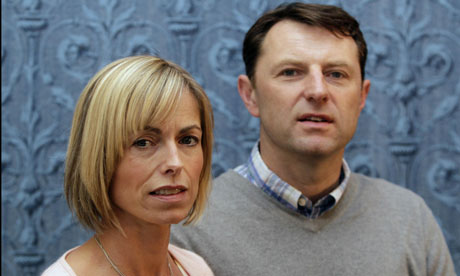|
 |
|
The prime minister said Kate and
Gerry McCann, parents of missing
Madeleine, had suffered at the
hands of the press. Photograph:
Niall Carson/PA |
An independent regulator which has "real teeth" is needed to fix
the broken system of British press
regulation and will be judged successful
only if it can stop a repeat of the
painful experiences suffered by the
families of murdered teenager Milly
Dowler and missing toddler Madeleine
McCann, David Cameron has said.
The prime minister told the Leveson inquiry into press ethics that
the Press Complaints Commission had
failed and the future regulator had to
be independent of the press.
"It can't be self-regulation, it has to be independent regulation,"
he said adding that the new regulatory
framework needed to punish newspapers
who were persistently breaching the
rules.
"Where mistakes are made and bad practice happens there are real
penalties as a result," he said.
"It must be independent – and seen to be independent, you can't opt
out of it. It has to have real teeth in
terms of penalties and the ability to
get out and find out what happened
rather than just deal with self-reported
problems," he said addressing criticism
that the PCC did not actively
investigate allegations of phone hacking
at the News of the World and merely
accepted News International's word that
it was not widespread.
The PCC, which has been running for 21 years, is being wound down,
and proposals for a replacement
regulator have been submitted to the
Leveson inquiry by Lord Hunt, the former
Tory minister who was appointed to move
the PCC into the new regulatory system.
"I've looked carefully at what David Hunt is suggesting. I think he
has some very good ideas there.
"I think they have to be rigorously tested as to whether they can
deliver independence, penalties,
compulsion, toughness, public confidence
and all the rest of it," Cameron told
the inquiry.
The cases of the Dowlers and the McCanns, who accepted £550,000
from Express newspapers in 2008 for
defamatory articles, was a "powerful"
reminder of the failures of the existing
system.
"I will never forget meeting the Dowler family in Downing Street to
run through the terms of this inquiry
with them and to hear what they had been
through and how it had redoubled,
trebled the pain and agony they'd been
through over losing Milly. I'll never
forget that, and that's the test of all
this," he said.
He said the new system was not there to make politicians or the
press feel happy but to protect innocent
people like the McCanns and Dowlers "who
have been caught up and absolutely
thrown to the wolves".
The prime minister stressed that the new body should prioritise
achieving swift justice for ordinary
people rather than protecting the rich
and famous.
Lord Justice Leveson admitted that asking Cameron for his views on
press regulation might be out of line
given that the prime minister had asked
him to come up with recommendations in
the first place.
Cameron duly sat on the fence over the issue of whether the future
body should be backed up by new laws,
something critics have warned could be a
slippery slope to government controls
over the press.
But the prime minister hinted that he may favour a robust form of
self-regulation as long as it passed the
"Dowler" test when Leveson reports back
in October.
He said his former incarnation as a head of communications for an
ITV company, the now defunct Carlton
Communications, gave him first hand
experience of "full-on statutory
regulation" requiring impartiality and
balance and this wasn't necessary for
newspapers.
"If we can make a self-regulatory system work that is genuinely
independent and the "self" sort of
disappears, that would be fantastic, but
what matters is the outcome rather than
the title, as it were," he said.


